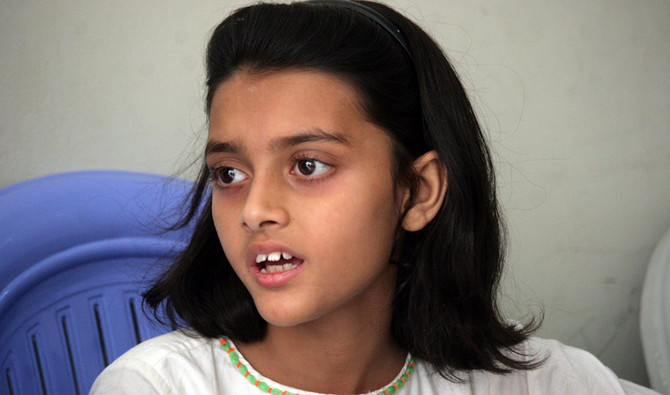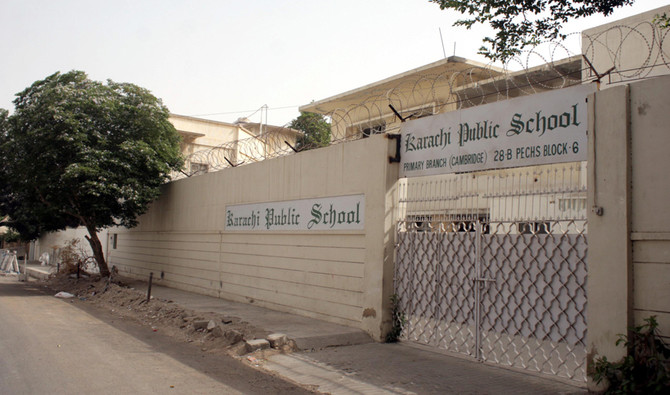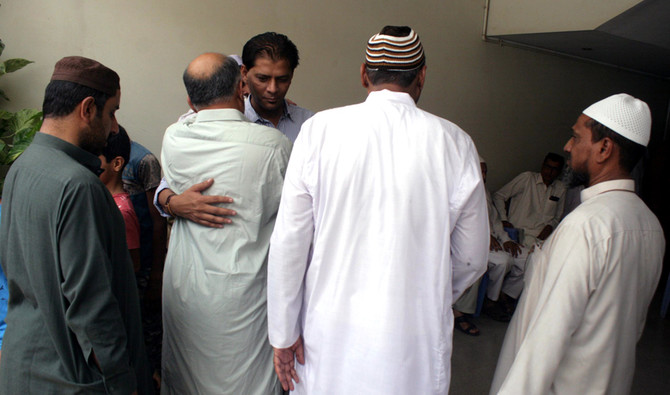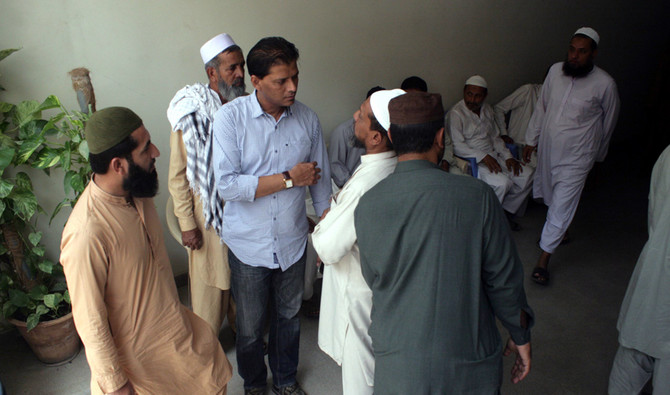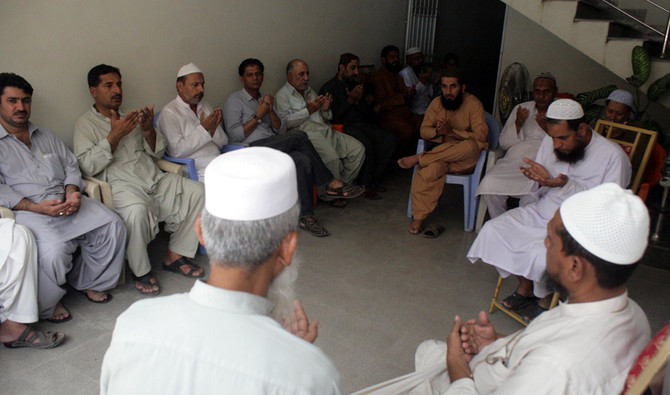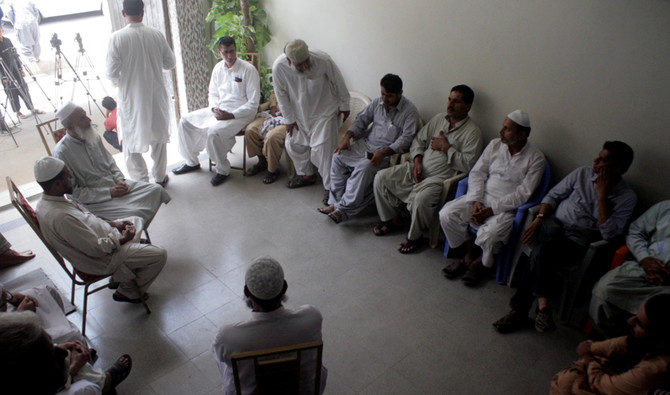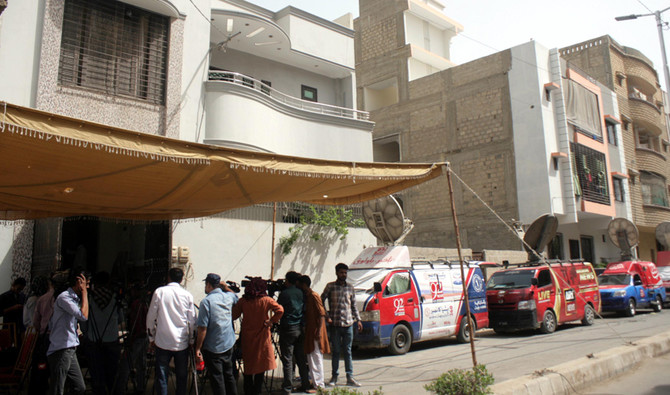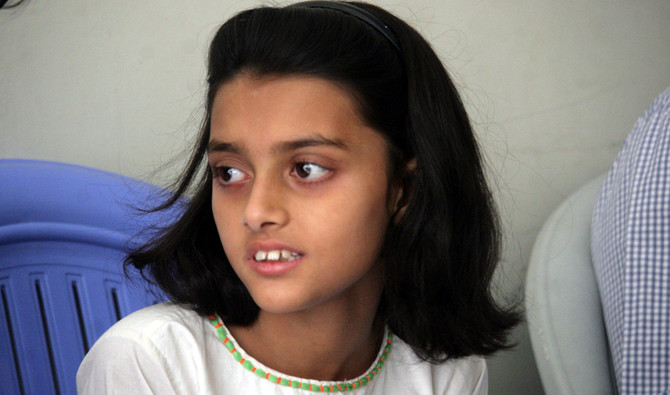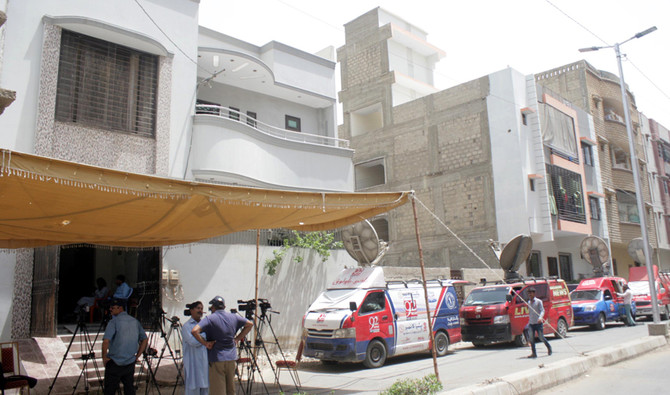KARACHI: Sabika Aziz Shaikh, the Pakistani victim of the Texas school shooting, wanted to join the Foreign Service of Pakistan and improve the image of her country.
This was revealed by her father, Abdul Aziz Shaikh, during an interview with Arab News on Sunday. The 17-year-old Pakistani foreign exchange student, participating in the Kennedy-Lugar Youth Exchange and Study (YES) program in the US, was killed along with nine others when a teenage classmate opened fire on fellow students in the Santa Fe High School in Texas on Friday.
When the tragic news reached Sabika’s hometown, her friends, relatives and other people started pouring in to her residence in Gulshan-e-Iqbal, Karachi in order to mourn her death and condole with the bereaved family.
Sabika’s father said that most children dream of becoming doctors or engineers. “Sabika wanted to sit the Central Superior Services (CSS) exams and join the Foreign Service of Pakistan. She thought that Pakistan was a great country, but that it had an image problem.”
“At one point, she told me that she wanted to be like Maleeha Lodhi and Tasneem Aslam,” said Abdul Aziz Shaikh. “Her desire was to improve the image of Pakistan abroad.”
“She was not very studious and did not study for long hours but she was extremely intelligent. She liked to hang out with friends and family and was full of life,” Abdul Aziz Shaikh said.
He recalled the day he took his daughter to a local hospital for a blood test, saying she did not like needles and resisted the idea of being pricked in her arm.
“When I told her that her unwillingness would make it difficult for her to fulfill her dream of studying in the US, she gave in. But she cried while they were taking her blood,” he said in a state of grief, adding: “She was so scared of needles. It’s hard for me to imagine what she must have thought on hearing gunshots that fateful day.”
“Was she crying at that moment, taking my name or thinking of her mother? I haven't been able to get these thoughts out of my mind ever since hearing the news of her death,” Abdul Aziz Shaikh said in a feeble voice.
“Daughters are usually closer to their fathers. but Sabika was also the darling of her mother. She had close attachments to everyone. And my youngest daughter, Soha, has lost her best buddy,” he said.
Soha recalled her last conversation with Sabika as she spoke to Arab News. On Thursday, her sister had said that she would be back in Pakistan after 19 days. “She told me that she had bought gifts for us, asking me if I wanted anything specific from the US,” said Soha.
She was fond of Pakistani cuisine. “She told me that she wanted to have Bismillah Biryani – from our old neighborhood of Shah Faisal – when she came back to the country,” Soha said.
“She was fasting when she was shot,” Abdul Aziz Shaikh continued. “She wanted to fast for the whole month.”
Ali Aziz, Sabika’s brother, told Arab News that she “was among the 75 students who got selected for the exchange program out of five thousand applicants.”
“She made us proud and didn’t put any financial burden on her family since winning the prestigious scholarship. She was very excited and happy when she left for the US. She left her O Level incomplete and was planning to continue it on her return,” Abdul Aziz Shaikh said.
Talking to the media outside Sabika’s residence in Karachi, Shehla Shamim, principal of the Karachi Public School, said that Sabika was a position holder.
“She was not just a student but a representative of Pakistan. She was proud of going to the US and told me that she wanted to carry Pakistani culture to that country with her,” she said.
Her father told Arab News that Sabika’s body had been handed over to the Muslim community and would be sent to Pakistan soon.
“We will offer her funeral prayer on Tuesday morning,” he said.
Sabika wanted to improve Pakistan's image abroad, says her father
Sabika wanted to improve Pakistan's image abroad, says her father

- Seventeen-year-old Pakistani girl wanted to be a diplomat and improve her country’s image abroad.
- Her father says she wanted to be like Tasneem Aslam and Maleeha Lodhi.
South Korea’s impeached president is arrested over a martial law declaration as his supporters riot

- The crisis began when Yoon, in an attempt to break through legislative gridlock, imposed military rule and sent troops to the National Assembly and election offices
- After managing to get through a blockade, lawmakers voted to lift the measure. The opposition-dominated assembly then voted to impeach Yoon on Dec. 14
SEOUL,: South Korea’s impeached President Yoon Suk Yeol was formally arrested early on Sunday, days after being apprehended at his presidential compound in Seoul. He faces possible imprisonment over his ill-fated declaration of martial law last month.
Yoon’s arrest could mark the beginning of an extended period in custody, lasting months or more.
The decision to arrest Yoon triggered unrest at the Seoul Western District Court, where dozens of his supporters broke in and rioted, destroying the main door and windows. They used plastic chairs, metal beams and police shields that they managed to wrestle away from officers. Some were seen throwing objects and using fire extinguishers, destroying furniture and glass doors. They shouted demands to see the judge who had issued the warrant, but she had already left.
Hundreds of police officers were deployed and nearly 90 protesters were arrested. Some injured police officers were seen being treated at ambulance vans. The court said it was trying to confirm whether any staff members were injured and assess the damage to its facilities.
A court deliberated for 8 hours
Following eight hours of deliberation, the court granted law enforcement’s request for an arrest warrant for Yoon, saying he was a threat to destroy evidence. Yoon and his lawyers on Saturday appeared before the court and argued for his release.
Yoon, who has been in detention since he was apprehended Wednesday in a massive law enforcement operation at his residential compound, faces potential rebellion charges linked to his declaration of martial law on Dec. 3, which set off the country’s most serious political crisis since its democratization in the late 1980s.
The Corruption Investigation Office for High-Ranking Officials, which is leading a joint investigation with police and the military, can now extend Yoon’s detention to 20 days, during which they will transfer the case to public prosecutors for indictment.
Yoon’s lawyers could also file a petition to challenge the court’s arrest warrant.
Yoon’s appearance in court triggered chaotic scenes in nearby streets, where thousands of his fervent supporters rallied for hours calling for his release. Even before the court issued the warrant for Yoon’s arrest, protesters repeatedly clashed with police who detained dozens of them, including about 20 who climbed over a fence in an attempt to approach the court. At least two vehicles carrying anti-corruption investigators were damaged as they left the court after arguing for Yoon’s arrest.
Yoon’s lawyers said he spoke for about 40 minutes to the judge during the nearly five-hour closed-door hearing Saturday. His legal team and anti-corruption agencies presented opposing arguments about whether he should be held in custody.
Yoon’s defense minister, police chief and several top military commanders have already been arrested and indicted for their roles in the enforcement of martial law.
Yoon’s lawyer decries his arrest
The crisis began when Yoon, in an attempt to break through legislative gridlock, imposed military rule and sent troops to the National Assembly and election offices. The standoff lasted only hours after lawmakers who managed to get through a blockade voted to lift the measure. The opposition-dominated assembly voted to impeach him on Dec. 14.
His political fate now lies with the Constitutional Court, which is deliberating whether to formally remove him from office or reinstate him.
Seok Dong-hyeon, one of Yoon’s lawyers, called the court’s decision to issue the warrant “the epitome of anti-constitutionalism and anti-rule of law,” maintaining Yoon’s claim that his martial law decree was a legitimate act of governance. He pointed to the chaos at the Seoul Western Court and said Yoon’s arrest would inspire more anger from his supporters.
Yoon’s People Power Party regretted his arrest but also pleaded for his supporters to refrain from further violence.
The liberal opposition Democratic Party, which drove the legislative effort to impeach Yoon on Dec. 14, said his arrest would be a “cornerstone for restoring the collapsed constitutional order.” Kim Sung-hoi, a party lawmaker and spokesperson, called for stern punishment of Yoon’s supporters who stormed the court.
“I urge police to firmly enforce the law so that forces supporting rebellion will never even think of causing turmoil again,” he said.
The country’s acting leader, Deputy Prime Minister Choi Sang-mok, expressed “strong regret” about the violence at the court, saying it “directly undermines democracy and the rule of law.” He asked for heightened security at the sites related to Yoon’s case and measures to ensure order during protests.
Yoon was transported to the court from a detention center in Uiwang, near Seoul, in a blue Justice Ministry van escorted by police and the presidential security service, to attend the hearing at the court ahead of its warrant decision.
The motorcade entered the court’s basement parking space as thousands of Yoon’s supporters gathered in nearby streets amid a heavy police presence. Following the hearing, Yoon was transported back to the detention center, where he awaited the decision. He did not speak to reporters.
After its investigators were attacked by protesters later on Saturday, the anti-corruption agency asked media companies to obscure the faces of its members attending the hearing.
Yoon insists his martial law decree was legitimate
Yoon and his lawyers have claimed that the martial law declaration was intended as a temporary and “peaceful” warning to the liberal opposition, which he accuses of obstructing his agenda with its legislative majority. Yoon says the troops sent to the National Election Commission offices were to investigate election fraud allegations, which remains unsubstantiated in South Korea.
Yoon has stressed he had no intention of stopping the functioning of the legislature. He stated that the troops were sent there to maintain order, not prevent lawmakers from entering and voting to lift martial law. He denied allegations that he ordered the arrests of key politicians and election officials.
Military commanders, however, have described a deliberate attempt to seize the legislature that was thwarted by hundreds of civilians and legislative staff who helped lawmakers enter the assembly, and by the troops’ reluctance or refusal to follow Yoon’s orders.
If prosecutors indict Yoon on rebellion and abuse of power charges, which are the allegations now being examined by investigators, they could keep him in custody for up to six months before trial.
If the first court convicts him and issues a prison term, Yoon would serve that sentence as the case possibly moves up to the Seoul High Court and Supreme Court. Under South Korean law, orchestrating a rebellion is punishable by life imprisonment or the death penalty.
Nigerian gasoline tanker explosion kills at least 70 people

- Authorities said the blast happened after individuals attempted to transfer gasoline from one tanker into another truck using a generator
ABUJA, Nigeria: At least 70 people have died in north-central Nigeria after a gasoline tanker exploded, the country’s emergency response agency said.
The blast happened in the early hours of Saturday near the Suleja area of Niger state after individuals attempted to transfer gasoline from one tanker into another truck using a generator.
The fuel transfer sparked the explosion, resulting in the deaths of those transferring the gasoline and bystanders, Hussaini Isah, of the National Emergency Management Agency, told the Associated Press.
Search and rescue operations were underway, Isah said.
With the absence of an efficient railway system to transport cargo, fatal truck accidents are common along most of the major roads in Nigeria, Africa’s most populous country.
In September, an explosion killed at least 48 people in Niger state after gasoline tanker collided with another truck conveying cattle.
There were 1,531 gasoline tanker crashes in 2020 resulting in 535 fatalities and 1,142 injuries, according to Nigeria’s Federal Road Safety Corps.
Trump wants to visit China as president, WSJ reports

- Trump has expressed interest in traveling to China in his first 100 days in office, the report said
US President-elect Donald Trump has told advisers he wants to travel to China after he takes office, the Wall Street Journal reported on Saturday, quoting people familiar with the discussions.
Trump has expressed interest in traveling to China in his first 100 days in office, the report said, citing one of the people.
Trump’s inauguration is Monday, and Chinese state news agencies said on Friday that Chinese Vice President Han Zheng will attend as Beijing stands ready to strengthen cooperation.
Trump and Chinese President Xi Jinping, through their representatives, have discussed meeting in person, with one option involving the incoming American president inviting the Chinese leader to the US, the WSJ added.
The Chinese embassy in Washington did not immediately respond to a request for comment.
German ambassador warns of Trump plan to redefine constitutional order, document shows

- Ambassadors are not replaced automatically with the formation of a new government, unless a change is deemed necessary for diplomatic or other reasons
BERLIN: Germany’s ambassador to the United States has warned that the incoming Trump administration will rob US law enforcement and the media of their independence and hand big tech companies “co-governing power,” according to a confidential document seen by Reuters.
The briefing document, dated Jan. 14 and signed by Ambassador Andreas Michaelis, describes Donald Trump’s agenda for his second White House term as one of “maximum disruption” that will bring about “a redefinition of the constitutional order — maximum concentration of power with the president at the expense of Congress and the federal states.”
“Basic democratic principles and checks and balances will be largely undermined, the legislature, law enforcement and media will be robbed of their independence and misused as a political arm, Big Tech will be given co-governing power,” it says.
Trump’s transition team had no immediate comment on the ambassador’s assessment.
The German foreign ministry said US voters chose Trump in a democratic election, and it would “work closely with the new US administration in the interests of Germany and Europe.”
The outgoing government of Chancellor Olaf Scholz has largely refrained from direct public criticism of Trump since the election, but the ambassador’s confidential assessment offers a blunt view from a senior German official.
Ambassadors are not replaced automatically with the formation of a new government, unless a change is deemed necessary for diplomatic or other reasons.
The document cites the judiciary, and especially the US Supreme Court, as central to Trump’s attempts to further his agenda, but says that despite the court’s recent decision to expand presidential powers, “even the biggest critics assume that it will prevent the worst from happening.”
Michaelis sees control of the Justice Department and FBI as key to Trump reaching his political and personal goals, including mass deportations, retribution against perceived enemies and legal impunity.
He says Trump has broad legal options to force his agenda on the states, saying “even military deployment within the country for police activities would be possible in the event of declared ‘insurrection’ and ‘invasion’.”
The 1878 Posse Comitatus Act bars the federal military from participating in domestic law enforcement, with some exceptions.
Michaelis also foresees a “redefinition of the First Amendment,” saying Trump and billionaire X owner Elon Musk are already taking actions against critics and non-cooperating media companies.
“One is using lawsuits, threatening criminal prosecution and license revocation, the other is having algorithms manipulated and accounts blocked,” he says in the document.
Musk’s repeated endorsement of the far-right Alternative for Germany (AfD) ahead of the Feb. 23 national election has drawn ire in Berlin, but the government has stopped short of unanimously leaving his platform.
Berlin endured a particularly difficult relationship with the United States during the first Trump administration, facing costly tariffs and criticism over its failure to meet the NATO target on defense expenditure.
Trump rethinking next week’s planned immigration raids, report says

- “President Trump has been clear from day one ... he’s going to secure the border and he’s going to have the deportation operation,” Homan told Fox News ahead of Trump’s inauguration on Monday
WASHINGTON: President-elect Donald Trump’s incoming administration is reconsidering plans for immigration raids in Chicago next week after details were leaked, Trump’s “border czar” Tom Homan told the Washington Post in an interview on Saturday.
The new administration “hasn’t made a decision yet,” said Homan, the former acting director of US Immigration and Customs Enforcement, according to the report. “We’re looking at this leak and will make decision based on this leak,” he added.
ICE did not immediately respond to a request for comment.
Officials and rights advocates had said Trump’s administration would launch sweeps in multiple US cities almost as soon as he takes office on Monday, with Chicago considered a likely first location.
Dulce Ortiz, president of the Illinois Coalition for Immigrant and Refugee Rights, told Reuters that as many as 200 ICE agents were expected to start raids in the Chicago area on Monday at 5 a.m., aiming to catch people heading into work or starting their day.
The enforcement had been expected to continue for several days, she said. An ICE spokesperson referred questions to the Trump transition team, which did not immediately respond to a request for comment.
Reuters reported Friday that agents would also conduct raids in New York and Miami. The Wall Street Journal reported on Friday that ICE would stage a week-long operation in Chicago with potentially hundreds of agents.
Trump said in an NBC News interview on Saturday that launching the mass deportations he promised in his election campaign would be a top priority. But he declined to identify the cities targeted or when deportations would start.
“It will begin very quickly,” said Trump. “We have to get the criminals out of our country.”
Homan himself had appeared to confirm the raids earlier on Saturday, telling Fox News that “targeted enforcement operations” would quickly pursue some of what he said were 700,000 migrants who are in the US illegally and under deportation orders. He indicated the efforts would occur in several cities.
“President Trump has been clear from day one ... he’s going to secure the border and he’s going to have the deportation operation,” Homan told Fox News ahead of Trump’s inauguration on Monday.
Homan said the agency had carefully planned the operation and identified specific individuals for enforcement.
“Every target for this operation is well-planned, and the whole team will be out there for officers’ safety reasons,” he said.
Asked how the detention operations would be received in so-called sanctuary cities, which have pledged not to use city resources for federal immigration raids, Homan said sanctuary city policies were “unfortunate.”
In the case of targeted individuals who are already in local jails, he said the cities’ stance creates a threat to public safety. Cities would “release that public safety threat back into the community....and force (ICE) officers into communities,” Homan said.
He urged public officials of those cities to assist in the deportation raids, but added, “We’re going to do this, with or without their help. They are not going to stop us.”


